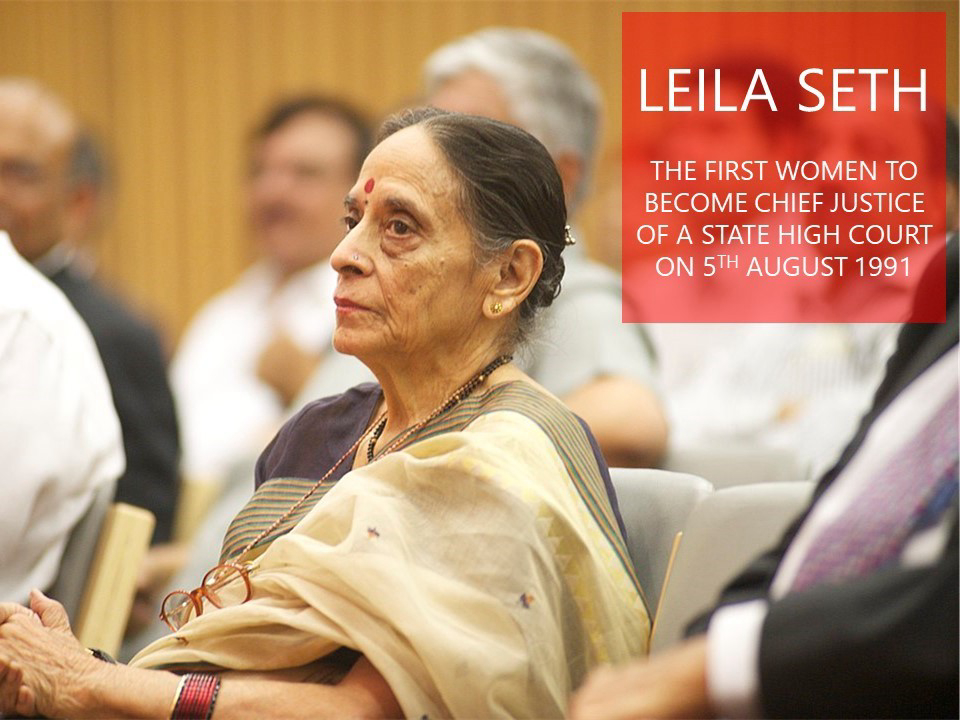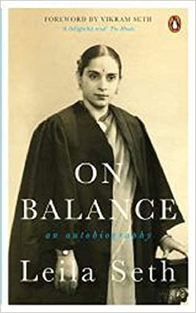
Image Credit: en.wikipedia.org
Legal professionals are held in high esteem in our society, and there remains the faith that when everything else fails, one can still take the path of the legal system. The legal field is said to have been a male-dominant profession, but then there's a woman in our country who have stood out and made a promising change. This cheerful woman has beaten the odds to prove herself as some of the most hard-working and successful professionals who have been contributing to the judicial system of the country, and this wonderful lady is named as, “Justice Leila Seth.”
Leila Seth was born on 20 October 1930 in Lucknow, and she was very close to her father, who worked in the Railway Service, but Leila was devastated when her father died when she was only 11 years old. After his death, the family struggled financially, but Leila's mother managed to finish her schooling, and Leila began to work as a stenographer in Kolkata. It was here when she was introduced to her husband Prem Seth, and after her marriage, she moved to London with her husband. Her move to London gave her the shining opportunity to start studying law. And in an interview, she said that she picked law for the simple reason that it did not require attending classes, which was a priority since she had a new born at the time.
In 1958, Leila Seth wrote the London Bar exam and topped it at the age of 27, becoming the first woman to do so. She joined the bar in 1959. In the same year, she also cleared the civil services examination as an IAS officer. Upon topping the Bar in England, Seth was referred to as "Mother-in-Law" by a London newspaper, which carried a photograph of a young Leila Seth with her infant son. At the same time, other newspapers expressed their grief about how out of 580 students who took the Bar Exam, a married woman topped it.
Immediately after the London Bar, Leila and Prem Seth moved back to India, where Leila began to practice law in Patna. She would initially not get a lot of work, as people did not think a woman lawyer would be capable of handling it, she has spoken about the discriminatory attitudes she had to face for being a woman in the male-dominated field of law. Still, she handled diverse cases, from Tax matters, Company Law, Constitutional Law, Civil, Criminal cases and also Matrimonial suits and public interest litigations. After practising at the Patna High Court for 10 years, Leila Seth moved to the Delhi High Court in 1972 and worked with original civil petitions, criminal matters, company petitions, revisions and appeals. On 10 January 1977, she was designated as a senior advocate by the Supreme Court. And in 1978, Leila Seth became the Judge of the Delhi High Court, breaking the glass ceiling by becoming the first woman to do so.
Her career continued to rise, as in 1991, Justice Leila Seth became the first female judge to be appointed as a Chief Justice of a state high court, and she was appointed as the Chief Justice of Himachal Pradesh. Her experiences in working in the High Court of Himachal Pradesh were not as glorious either. They were not used to a woman sitting on their head. But as she was a mother of two boys, she knew how to handle men sensitively. she would gently ask their opinions first before ‘imposing’ her on them.
She is similarly known for being on an enquiry commission which studied into the effects of the children’s popular TV series “Shaktiman”, since tragic incidents were rising where children would jump off buildings or even set themselves on fire, thinking that Shaktiman would come to save them. She was also the single member of the Justice Leila Seth Commission which enquired into the custodial death of popular “Biscuit Baron”, a businessman Rajan Pillai.
She was also a part of the 15th Law Commission of India from 1997 to 2000 and is known for spearheading the change in inheritance laws for women regarding the Hindu Succession Act, 1956, which finally gave daughters rights in their ancestral property.
She was moreover one of the three-panel members of the “Justice Verma Committee” set up to look into the complications of the rape law in India, following the aftermath of the Nirbhaya gang-rape case of Delhi in 2012. The Justice Verma Committee's report was moderately holistic and progressive in its recommendations. It dealt with the questions of gender, crime, and law with a lot of depth. Justice Leila Seth had also recommended that the rape law be made gender-neutral, with special importance that the survivors of any gender be allowed to seek a remedy. Her youngest son, ‘Vikram Seth’ came to be a celebrated author and activist soon, and the literary bug bit her too.
She penned down three books, beginning with “On Balance”, her autobiography in 2003.

She went on to write “We, The Children of India” in 2010, a book explaining constitution to the country's children.

This was followed by “Talking of Justice: People's Rights in Modern India”, in 2014.

Justice Leila Seth's journey is a reminder for us to never give up and never stop questioning the norm. This notable judge was the first woman Chief Justice of a High Court in India and was responsible for numerous amendments in law, but she died of a cardiac seizure at the age of 86 on May 5, 2017. As per her wishes, no funeral was held since she donated her organs for transplant or medical research purposes. Justice Leila lived a wide, optimistic and influential life, and her outlook towards challenges offered by stereotypes of society is one that we can all try and enclose in ourselves.
(Source - Wikipedia)
